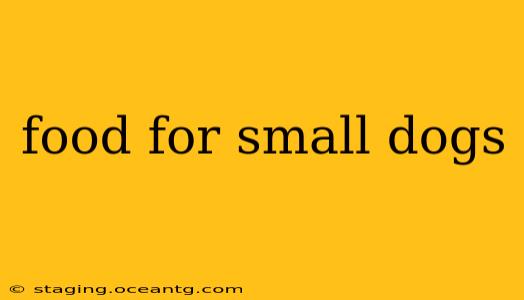Small dogs, with their adorable features and playful personalities, require a diet specifically tailored to their unique needs. Unlike their larger counterparts, they have faster metabolisms and smaller stomachs, demanding a higher-quality, nutrient-dense food. This comprehensive guide will explore everything you need to know about feeding your small canine companion, ensuring they thrive on a diet that supports their health and happiness.
What Kind of Food is Best for Small Dogs?
Choosing the right food for your small dog is crucial for their overall well-being. Look for foods specifically formulated for small breeds. These diets often address the nutritional needs of smaller dogs, considering their higher caloric requirements per pound of body weight and susceptibility to certain health issues.
Key factors to consider include:
- Breed-Specific Formulas: Some brands offer formulas tailored to specific small breeds, accounting for variations in size and metabolic rates.
- High-Quality Protein Sources: Protein is essential for muscle development and overall health. Opt for foods with named meat sources (e.g., chicken, lamb, salmon) listed prominently on the ingredient list.
- Healthy Fats: Essential fatty acids contribute to a healthy coat and skin. Look for sources like fish oil or flaxseed oil.
- Fiber Content: Adequate fiber promotes healthy digestion.
- Added Vitamins and Minerals: Small dogs may require higher concentrations of certain vitamins and minerals to support their growth and overall health.
Avoid foods with:
- Artificial colors, flavors, and preservatives: These can be detrimental to your dog's health.
- Fillers: Ingredients like corn, wheat, and soy can be less digestible and provide minimal nutritional value.
- Excessive amounts of carbohydrates: Small dogs are prone to weight gain, so avoid foods with high carbohydrate content.
What Size Food Bowl Should I Use for My Small Dog?
The size of your dog's food bowl should be proportionate to their size. A bowl that's too large might make it difficult for them to eat comfortably, while one that's too small could lead to spills and frustration. Look for shallow bowls designed specifically for small breeds. Stainless steel or ceramic bowls are durable and easy to clean.
How Much Food Should I Feed My Small Dog?
Feeding amounts depend on several factors including your dog's age, breed, activity level, and metabolism. Always follow the feeding guidelines on the food packaging, using your dog's weight as a reference point. However, these are just guidelines. Regularly monitor your dog's body condition—their weight and waistline—adjusting portions as needed to maintain a healthy weight. An overweight small dog is at a greater risk of developing health problems. Consult your veterinarian if you are unsure about the appropriate feeding amount for your dog.
What if My Small Dog is a Picky Eater?
Many small dogs are notorious picky eaters. Here are some strategies to encourage them to eat:
- Try different food brands and flavors: Not all small dogs enjoy the same foods. Experiment with different brands and formulations until you find one your dog relishes.
- Warm up the food slightly: This can enhance the aroma and make the food more appealing.
- Offer small, frequent meals: Instead of two large meals, try several smaller meals throughout the day.
- Make mealtime enjoyable: Create a positive association with mealtime by keeping the bowl clean and avoiding distractions during feeding.
- Consult your veterinarian: Picky eating can be a sign of underlying health issues. If your dog is consistently refusing food, consult your veterinarian to rule out any medical problems.
What are the best brands of small dog food?
There isn't a single "best" brand, as preferences vary among dogs. Research and read reviews of various brands formulated for small breeds. Consider factors like ingredient quality, price, and your dog's individual preferences. Talk to your veterinarian; they often have recommendations based on their experience.
Can I feed my small dog human food?
While some human foods are safe for dogs in moderation, it's generally best to stick to dog food formulated to meet their nutritional needs. Many human foods are toxic to dogs (chocolate, grapes, onions, etc.). Always check with your veterinarian or a trusted source before giving your dog any human food.
How often should I feed my small dog?
Typically, small dogs do well with two meals a day. However, puppies and older dogs might benefit from more frequent, smaller meals. Again, consult your veterinarian for personalized recommendations.
Are there any specific health concerns related to feeding small dogs?
Small breed dogs are prone to certain health issues, including dental problems, hypoglycemia (low blood sugar), and obesity. Choosing a high-quality diet and maintaining a healthy weight are crucial in mitigating these risks. Regular veterinary checkups are essential for early detection and management of any potential health problems.
This guide provides a starting point for feeding your small dog. Remember, every dog is an individual, so observation and communication with your veterinarian are key to ensuring your furry friend receives the optimal nutrition they need to live a long and healthy life.
